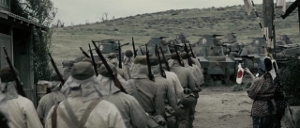 World War II films and I have an understanding: I don’t watch them and they can go on propping up whatever brand of historical whitewashing is popular at moment. Rare is the film that consciously sets out to subvert the usual tropes of their perpetually John Wayne genre, or the deification of Tom Brokaw’s “Greatest” Generation. Whenever such a film emerges from the vacuous, exploitative, corporatist, Hollywood hive it is duly acknowledged by critics, nodded at by the Academy Awards…and promptly forgotten about. Case in point:
World War II films and I have an understanding: I don’t watch them and they can go on propping up whatever brand of historical whitewashing is popular at moment. Rare is the film that consciously sets out to subvert the usual tropes of their perpetually John Wayne genre, or the deification of Tom Brokaw’s “Greatest” Generation. Whenever such a film emerges from the vacuous, exploitative, corporatist, Hollywood hive it is duly acknowledged by critics, nodded at by the Academy Awards…and promptly forgotten about. Case in point:
Begun as a companion piece to Flags of Our Fathers, Letters hopes to turn the American War Film upside down by dramatizing the Japanese side of the Battle of Iwo Jima, just in time for its sixty-first anniversary, with all the historical histrionics that entailed (on both sides of the Pacific). Opening sometime in 1945, the film attempts to (and largely succeeds at) do(ing) for the Honorable Imperial Army of Japan what Das Boot did for German submariners: portraying them as actual human beings trapped in a horrific situation. And since I can’t think up a proper joke to end this paragraph, I’ll go for the long hanging fruit and ask how many Bella Swan’s does it take to screw in a lightbulb?
(Answer: None, since the act of opening the box would undoubtedly cause her to trip, fall, and wind up bleeding on the floor, mewing kittenishly at the nearest shirtless man-thing within easy mewing distance.)
 We arrive on Iwo Jima with Lieutenant General Tadamichi Kuribayashi (the eternal, irreplaceable, Ken Watanabe), charged with defending one of the most God-forsaken rocks in the entire Pacific Rim. As the film follows General Kuribayashi, breaking off only to meet and greet the supporting cast, he and we quickly realize that the Iwo Jima garrison is up shit creek and the Americans just captured their last paddle somewhere around Mariana. There’s no food on the island to speak of, the water gives you dysentery, the tanks all need replacement parts, the Imperial Navy’s spread across several thousand miles of Pacific seabed, and Tokyo just ordered all their air support back to the Home Islands. The notations on our General’s maps might as well spell out “Y-O-U’R-E -F-U-C-K-E-D.” And the real hell of it is every character knows this from the start.
We arrive on Iwo Jima with Lieutenant General Tadamichi Kuribayashi (the eternal, irreplaceable, Ken Watanabe), charged with defending one of the most God-forsaken rocks in the entire Pacific Rim. As the film follows General Kuribayashi, breaking off only to meet and greet the supporting cast, he and we quickly realize that the Iwo Jima garrison is up shit creek and the Americans just captured their last paddle somewhere around Mariana. There’s no food on the island to speak of, the water gives you dysentery, the tanks all need replacement parts, the Imperial Navy’s spread across several thousand miles of Pacific seabed, and Tokyo just ordered all their air support back to the Home Islands. The notations on our General’s maps might as well spell out “Y-O-U’R-E -F-U-C-K-E-D.” And the real hell of it is every character knows this from the start.
Breaking with what passed for conventional wisdom in the Imperial Army of his time, Kuribayashi sets about more-or-less alienating his men with an elaborate defensive plan involving tunnels, fatherly speechifying, and what comes across as intelligence due to the film’s obvious sympathy for him and his own (historically accurate but nevertheless predictable) distaste for banzai tactics. Not that the film bothers to explain why, if banzi tactics were so futile and useless, so many otherwise-presumably-intelligent people willingly engaged in them right up until War’s End. We don’t even hear the Imperial Army’s propaganda line of the time, beyond the usual, flag-waving, my-country-’tis-of-thee level…not that I’m really surprised. With the exception of his old friend and XO-by-default, Baron Nishi (Tsuyoshi Ihara), Kuribayashi is a lonely, tragi-heroic figure set adrift in a sea of character types that veer dangerously-close to maudlin. Not that I’m surprised by that either.
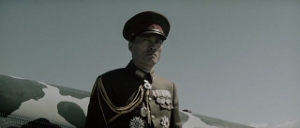 You see, Clint Eastwood and I have this little problem called The Bridges of Madison Country. That film came between us the way other women come between you and your mom, and I’ve never really forgiven the man for making that extended soap opera. I certainly stopped trusting him. Ever since, I’ve weathered my own mother’s repeated recommendations of his late-period films with as much polite grace as I can. I’m not saying Letters repairs all the damage Clint did to his and my relationship…it just might be a start, but I still see signs of the same dangerous, rampaging sentimentality that turned me away from Stephen Spielberg (Eastwood’s partner in this production). This is, after all, the man who gave us Space Cowboys before giving us whiplash when he turned right around and made Blood Work.
You see, Clint Eastwood and I have this little problem called The Bridges of Madison Country. That film came between us the way other women come between you and your mom, and I’ve never really forgiven the man for making that extended soap opera. I certainly stopped trusting him. Ever since, I’ve weathered my own mother’s repeated recommendations of his late-period films with as much polite grace as I can. I’m not saying Letters repairs all the damage Clint did to his and my relationship…it just might be a start, but I still see signs of the same dangerous, rampaging sentimentality that turned me away from Stephen Spielberg (Eastwood’s partner in this production). This is, after all, the man who gave us Space Cowboys before giving us whiplash when he turned right around and made Blood Work.
I’m glad to report that Clint seems to have made up his mind sometime around 2003 and begun making Serious Films based on Serious Books that he Seriously Loved. In this case, Eastwood chose a Serious Script by fellow-former-Missourian Iris Yamashita, and it’s seriously perfect for him: a framed story about an battled-hardened older character alienated from his culture by an understanding born from personal history, adrift in a world of moral (and, since this is Iwo Jima, literal) gray. In this case, Kuribayashi’s and Nishi’s personal experiences in the United States allow them a perspective on the Enemy the rank n’ file don’t possess. If they did, how could they Learn Anything from the dreadful experience they’re about to go through?
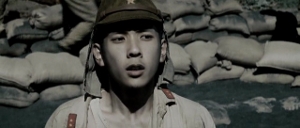 And it is suitably dreadful. But I just realized I’m seven hundred words in and I haven’t even mentioned our POV character by name. Saigo (Kazunari Ninomiya) is an ex-baker drafted into “glorious” service to his country despite (can your heart stand this shocking fact?) the wife and girl-child he’s got waiting for him back home. And that’s about all he’s got waiting for him, since the Secret Police of his time have a bad habit of requisitioning anything that’s not nailed down in the name of “the war effort” and “patriotism.” Immediately my genre-trained mental alarms rang out like Tokyo air raid sirens and I hazarded a guess as to Saigo’s eventual fate. Now you may want to wrap a towel around your head because I’m about to blow your mind and admit I was wrong. The fact that this film surprised even jaded old me goes a long way toward mollifying my first critical instinct, which remains as combative as the film’s Neidermeyer, Lt. Ito (Shido Nakamura).
And it is suitably dreadful. But I just realized I’m seven hundred words in and I haven’t even mentioned our POV character by name. Saigo (Kazunari Ninomiya) is an ex-baker drafted into “glorious” service to his country despite (can your heart stand this shocking fact?) the wife and girl-child he’s got waiting for him back home. And that’s about all he’s got waiting for him, since the Secret Police of his time have a bad habit of requisitioning anything that’s not nailed down in the name of “the war effort” and “patriotism.” Immediately my genre-trained mental alarms rang out like Tokyo air raid sirens and I hazarded a guess as to Saigo’s eventual fate. Now you may want to wrap a towel around your head because I’m about to blow your mind and admit I was wrong. The fact that this film surprised even jaded old me goes a long way toward mollifying my first critical instinct, which remains as combative as the film’s Neidermeyer, Lt. Ito (Shido Nakamura).
In the universe of all incompetent officers, Ito makes Lt. Gorman (from Aliens) look like a paragon of experience and reasonableness. We first meet Saigo as he and a fellow doomed Red Shirt are saved from an Ito-brand flogging by General Kuribayashi, who (“correctly”) feels flogging is a waste of energy all around. Throughout the film, Saigo finds himself constantly struggling against the black-n’-white morality of an officer class who’ve (with two exceptions) sucked deep from the tit of Imperial propaganda. As the American invasion decays into the thirty-odd days of skirmishing and night-fighting it was, Saigo finds himself adrift in his own gray, sand-and dust-splattered universe, where the “honorable” thing to do is almost never “intelligent” and even “intelligent” actions (in a good ol’ Utilitarian sense) will net you a quick handshake with a cloud of American bullets. In other words: War is Cruelty, gentlemen. You cannot refine it. Unless you refine it into a few thousand feet of purty pictures.
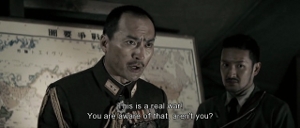 I could go on and on about how good a director is our Eastwood, and heap praise upon his technical prowess. I could heap more upon Eastwood’s DP-of-choice, Tom Stern, who’s color pallet adds a dingy, almost-period-piece look to the film, utilizing the drab landscape of Iwo Jima to a wonderful effect that’s down-right Japanese at times: possessed of the starkly-doomed beauty Shinto and Zen artists love so much they’ll make you grind your teeth out of your head. Apart from fire-orange and blood-red, war drains what little color there is right out of the film, even as the script drains away any hope that our characters might survive.
I could go on and on about how good a director is our Eastwood, and heap praise upon his technical prowess. I could heap more upon Eastwood’s DP-of-choice, Tom Stern, who’s color pallet adds a dingy, almost-period-piece look to the film, utilizing the drab landscape of Iwo Jima to a wonderful effect that’s down-right Japanese at times: possessed of the starkly-doomed beauty Shinto and Zen artists love so much they’ll make you grind your teeth out of your head. Apart from fire-orange and blood-red, war drains what little color there is right out of the film, even as the script drains away any hope that our characters might survive.
I could call Iris Yamashita’s script a deftly-constructed horror story because that’s just about the highest complement I’ve got close at hand, her tension-ratcheting scenes peppered with just the right amount of expository flashbacks, adding depth and shading to each maudlin character without ever killing the overall mood. I could bow in deep gratitude to everyone involved for the fragment of “give-a-shit” they kindled inside the black little coal of my heart…and promptly extinguished, since that’s what the best War is Hell films do, if they’re smart.
But you don’t call a pimp to help patch things up with your wife, and you didn’t come here to hear me rip-off every other review on Planet Internet, all of whom praised this film (with one or two exceptions I’m too lazy to find and link to, so I’ll just assume they exist). I’m assuming you came here to watch me take the piss out of a film, and in the process spew another five hundred or so words of my usual “dribbling political shit,” as one of my favorite commenters so-aptly put it.
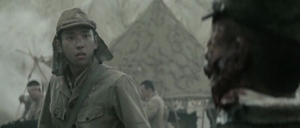 The obsession with portraying World War II as a black and white morally conflict is by no means American. But I’m surprised at how easily American and Japanese movie critics were surprised by this film’s successful subversion of this. We must not be as egalitarian and morally advanced as we’d all like to believe. If we were, Eastwood’s ability to empathize and dramatize “our” war-time “enemies” would be par for the course instead of the high-and-wide-from-left-field surprise it unfortunately was. And despite our mostly-Japanese cast and almost-exclusive reliance on subtitles there’s a distinctly American flavor to the whole proceedings: a “let’s-just-bug-out-and-call-it-even” pragmatism born from General Kuribayashi’s education and Private Saigo’s direct experience.
The obsession with portraying World War II as a black and white morally conflict is by no means American. But I’m surprised at how easily American and Japanese movie critics were surprised by this film’s successful subversion of this. We must not be as egalitarian and morally advanced as we’d all like to believe. If we were, Eastwood’s ability to empathize and dramatize “our” war-time “enemies” would be par for the course instead of the high-and-wide-from-left-field surprise it unfortunately was. And despite our mostly-Japanese cast and almost-exclusive reliance on subtitles there’s a distinctly American flavor to the whole proceedings: a “let’s-just-bug-out-and-call-it-even” pragmatism born from General Kuribayashi’s education and Private Saigo’s direct experience.
I mention that as a ham-handed lead-in to something that stuck in my craw the whole way through: both the high-ranking audience identification characters have some connection to America, while all the low-hanging fruits have a Defining Element of Tragedy in their pasts, which the film dutifully explores…eventually. Flashbacks are all well and good early on when you, as a film, are attempt to identify and flesh out your characters. But once the Americans land and the machine gun ammo mysteriously disappears into the bodies of several thousand anonymous Marines these flashbacks to “happier” times come like jarring blows to a head that thought itself safely encased in “the good part.” Mine, in other words.
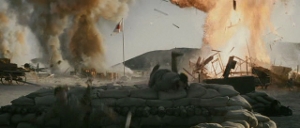 The point is, if this really is a “respectful” dramatization of the Japanese side of its titular Battle, why does the film dismiss every member of the Iwo Jima garrison who actually believes in what they’re bloody-well doing? I expected a bit of Imperial justification to crop up at some point along the line once the film’s Designated New Meat, Private Shimizu (Ryu Kase), showed up and started alienating the rest of the grunts by dropping his Tokyo-based training in everyone’s collective lap. (The rest of the cast translates his, “I was trained in Tokyo,” as, “Hi! I’m a member of the Secret Police! Feel free to voice all those treasonous, unpatriotic sentiments you and I both know are knocking around your heads.”)
The point is, if this really is a “respectful” dramatization of the Japanese side of its titular Battle, why does the film dismiss every member of the Iwo Jima garrison who actually believes in what they’re bloody-well doing? I expected a bit of Imperial justification to crop up at some point along the line once the film’s Designated New Meat, Private Shimizu (Ryu Kase), showed up and started alienating the rest of the grunts by dropping his Tokyo-based training in everyone’s collective lap. (The rest of the cast translates his, “I was trained in Tokyo,” as, “Hi! I’m a member of the Secret Police! Feel free to voice all those treasonous, unpatriotic sentiments you and I both know are knocking around your heads.”)
Except (and brace yourself, because I’m about to be massive dick) that’s all a giant mislead on the film’s part. A mislead that only works because the film spends ninety minutes ignoring Shimizu completely, only returning to him after all of Saigo’s actual friends have become flamethrower and grenade-shrapnel smears on the walls of their recently-completed tunnels. A jarring mood-breaker of a flashback follows, managing to cast the Secret Police as unfathomable dicks and reveal how thin the film’s pretenses of revisionism really are when all’s said and done. After all, had Shimizu been as big a dick as his superior, he would never have wound up on Iwo.
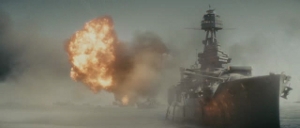 An honest-to-God brave film might’ve allowed Shimizu to command the same Powers of Flashback and Voiceover every other main character deploys whenever they pick up a piece of paper and a half-decent writing utensil. It might’ve brought his flashback to the fore, or (how about this) made him the audience identification character, rather than focus on Saigo the Cowardly Lion. Both are equally wonderful actors, and I don’t mean to say they’re interchangeable…except their characters are. And for all its “even-handedness” (both the American and Japanese forces commit an Obligatory War Crime over the course of the film) a lot of Letters is interchangeable, copied straight from the How to Make a War is Hell Film playbook by Francis Ford Coppola, Second Edition, with annotations by Stephen Spielberg. But since all the character’s nationalities are reversed from the norm we’re all supposed to pretend this is a revolutionary flick, despite the mournful piano music that plays throughout, or the orchestral trumpeting that swells as soon as all hope is lost in true Spielbergian fashion.
An honest-to-God brave film might’ve allowed Shimizu to command the same Powers of Flashback and Voiceover every other main character deploys whenever they pick up a piece of paper and a half-decent writing utensil. It might’ve brought his flashback to the fore, or (how about this) made him the audience identification character, rather than focus on Saigo the Cowardly Lion. Both are equally wonderful actors, and I don’t mean to say they’re interchangeable…except their characters are. And for all its “even-handedness” (both the American and Japanese forces commit an Obligatory War Crime over the course of the film) a lot of Letters is interchangeable, copied straight from the How to Make a War is Hell Film playbook by Francis Ford Coppola, Second Edition, with annotations by Stephen Spielberg. But since all the character’s nationalities are reversed from the norm we’re all supposed to pretend this is a revolutionary flick, despite the mournful piano music that plays throughout, or the orchestral trumpeting that swells as soon as all hope is lost in true Spielbergian fashion.
Since I’m a big stick in the mud, I’m unwilling to give this film credit for something Das Boot did almost thirty years ago. Nevertheless, I liked it the same way I like slowing down to rubberneck whenever I pass a traffic accident. It’s a horrible story told well by a visually-adept director and a troop of people who can act rings around your average cast of American roughnecks. It’s gory without being gratuitous and self-aware without being cynical, since every character knows the big red sun on their flags might as well be a giant bullseye. Despite (or perhaps because of) this, I couldn’t tear myself away.
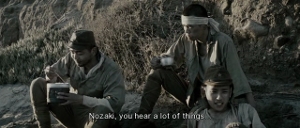 A good movie, in other words. But revisionist? Puh-leese. I, for one, figured out Japanese people were human beings decades ago. Glad the rest of this country has finally caught up with me. Cudos to all involved for making a painlessly middle-minded war film, as difficult to watch (in a good way) as its Anglicized elder-brethren. It’s a grinding exercise in watching doomed people meet horrible ends, the kind of horror most “horror” fans wouldn’t recognize if it shook titties in their face. If you actually do find the all-Japanese cast a novelty there’s a chance you might find Letters from Iwo Jima refreshing. If not, you could probably hammer out a long list of actual Japanese war films I should’ve reviewed tonight instead. A list I’ll be glad to ignore.
A good movie, in other words. But revisionist? Puh-leese. I, for one, figured out Japanese people were human beings decades ago. Glad the rest of this country has finally caught up with me. Cudos to all involved for making a painlessly middle-minded war film, as difficult to watch (in a good way) as its Anglicized elder-brethren. It’s a grinding exercise in watching doomed people meet horrible ends, the kind of horror most “horror” fans wouldn’t recognize if it shook titties in their face. If you actually do find the all-Japanese cast a novelty there’s a chance you might find Letters from Iwo Jima refreshing. If not, you could probably hammer out a long list of actual Japanese war films I should’ve reviewed tonight instead. A list I’ll be glad to ignore.
![]()
![]()
![]()
![]()

Ok but can there be memory without sentimentality? Can horror be displayed objectively? Is this film not also anti-war? You make a good case for your POV but your optimism is showing.
As far as I can tell, memory divorced from sentiment is usually called “history”…with all the problems that entails, since we all know who writes histories. It’s “anti-war” status is immaterial to my concerns: I’m here to nitpick its aesthetic foibles in the hopes of pointing out how it could’ve been a better “anti-war” movie, or just a better movie. All cinematic horrors are “displayed objectively” because the camera can’t help but objectify everything it captures, including people, tables, houseplants, pets, and (most especially) wars. Writers (and directors and whomever else has control over the script) shoulder the hard work of re-subjectifying (that’s not a word, but who’s counting?) the camera’s focus. Letters did that, and did it well…but that doesn’t mean there’s no room for improvement. This could’ve been the Japanese-language Apocalypse Now of its generation. Instead, its…what it is. And that’s okay…but it could’a been a contender.
” I, for one, figured out Japanese people were human beings decades ago. ”
Pluuzee ?
The ‘ Beaten japanese ‘ are the ones you know.
Had they Won, you’d have an entirely different outlook I assure you. As does anyone who felt their occupation.
Crack a book or two, maybe google Donald Knox
Ah, but you see, having cracked several books (including Knox’s) I know they didn’t win, leaving me trapped in my poor, provincial, reality-based perspective. Poor, poor, pitiful me.